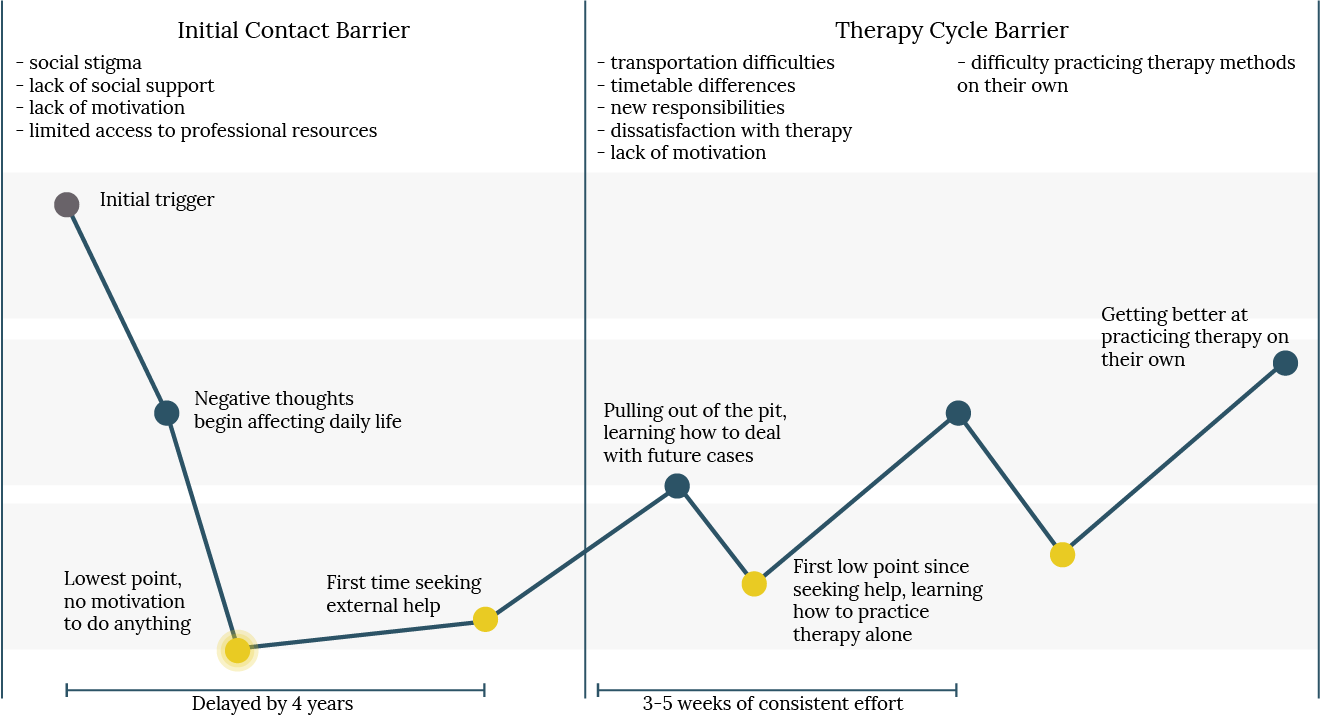Future of Mental Health
Innovation Design Engineering | Solo Project 2020
(For a detailed report on this project, please go here.)
The goal of this project was to explore the pain points of the recovery journey for depression and identify ways to support young adults in moments of need. The project does not aim to replace professional therapy, but acts as a bridge between the user and therapy, connecting the two (like a bridge over troubled water).
Studies have shown that mental disorders are on the rise in recent years. Chances are, we either know someone who is affected or are affected ourselves. According to the 2013 Chief Medical officer report, untreated poor mental health cost £70- 100 billion in GDP in the UK in 2013. Depression specifically is one of the leading causes of living with a disability worldwide. Though depression can affect any age, 19.7% of people in the UK aged 16 and over showed symptoms of anxiety or depression. Suicide is also the second-highest leading cause of death in 15-29-year-olds.
With the rise of artificial intelligence in the healthcare space, I wanted to see how I could utilize this technology to fill the gap in the existing user journey.
Background Research
Psychotherapy methods such as CBT (Cognitive Behavioral Therapy) are one of the most effective forms of therapy, even better than medication. Cognitive therapy was found to have only a 31% relapse rate, while antidepressants had a relapse rate of 70% in a 12 month period. It works so well because it targets the negative thinking pattern that often causes people to spiral into a depressive episode.
In spite of this, a survey conducted in 2013 found that 31% of people don’t seek professional help. Of the 69% that do seek help, only 62.5% seek professional help. Even then, treatment is usually delayed by 4 years.
It’s not just the initial contact that has barriers, but maintaining therapy sessions and practicing therapy methods like CBT on your own can be difficult as well. From interviews, people learning how to catch themselves when they’re having a negative thought spiral and change their mentality takes practice.
I spoke with Dr. Amy Hardy, a research clinical psychologist, and Helen Moss, a psychotherapist and counselor, and they both reaffirmed that a lot of times, getting people to start therapy and to continue it is difficult. Being able to use an AI system to extend their reach so that clients have a guidance system available to them 24/7 would be helpful. Also being able to have access to a record of what happens outside of therapy would be beneficial to both the client and therapist.
How do people feel about using AI for mental healthcare?
A survey conducted by PWC found that 60% of people ages 18-34 are willing to talk to an advanced computer or robot with AI to answer health questions, diagnose their condition and recommend treatment. In another study to research willingness to be vulnerable with a robot system, they used Ellie as the example. Ellie is a robot therapist used to screen soldiers for PTSD. In the study, half of the people were told Ellie was being controlled by a human and half were told Ellie was just a robot. It found that people were more willing to betray signs of sadness and were twice as likely to disclose personal information when they believed Ellie was just a robot.
Initial concept diagram
Identifying project space
Experiments
This project uses a DMI approach in order to find the best fit for the solution embodiment. As covid-19 began to affect daily life, it was difficult to do as much physical prototyping and in-person experimentation as I wanted to, which was a shame. Nevertheless, I tried my best to emulate situations and carried out surveys and interviews with users instead.
The ultimate goal of this project is to identify the embodiment and interactions for a mental health monitoring and guidance system for young adults.
(For a detailed report on this project, please go here.)
Final Concept: Ripple
Ripple is a one-stop-shop kit to introduce users to a set of healthy mental habits based on mindfulness cognitive behavioral therapy and combining what I’ve learned about how to integrate a ritual into daily life for young adults. It has a physical component and an app component. The physical component has a speaker and a camera that guides the user through yoga poses and gives feedback on how to adjust for correct posture. The speaker can also guide the user through short meditation sessions. The app side has a journaling tracker with a gamified system that encourages daily interaction. Ripple offers a healthy, phone-free alternative way to start the day, helping organize the day’s main goals and offering a boost of yoga or meditation to complement it.
(For a detailed report on this project, please go here.)







